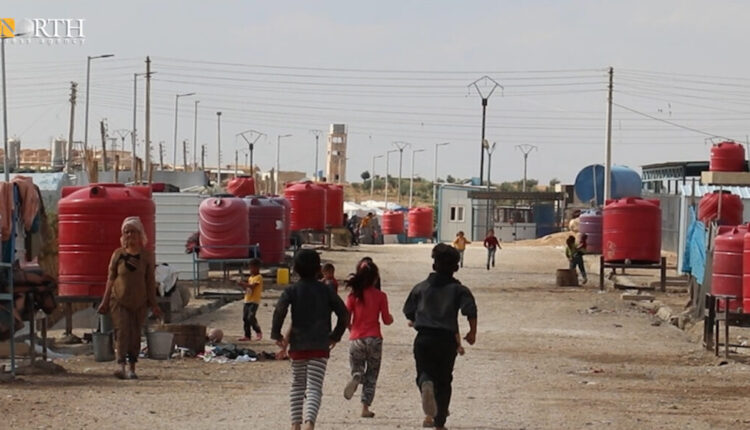
By Nalin Ali
HASAKAH, Syria (North Press) – Joza sits on a pile of dirt in an IDP camp that lacks the simplest essentials of life. She wonders what to tell her children who were born in a place far away from the city of Sere Kaniye (Ras al-Ain) in the northern countryside of Hasakah, northeastern Syria. How can she describe the features of their homeland while they only know its name.
In October 2019, Turkish forces, along with their opposition factions of the Syrian National Army (SNA), occupied the cities of Sere Kaniye and Tel Abyad and their surrounding areas after a military operation dubbed ‘Peace Spring’. The invasion caused the displacement of approximately 300,000 of the region’s original inhabitants.
Joza al-Hamad, 38, an IDP from Sere Kaniye who has been staying in Washokani camp in the countryside of Hasakah for four years, told North Press, “I wish to return to my city and house for the sake of my children, so they can live in the environment they were deprived of.”
Al-Hamad recalled the smallest details of her childhood and how she used to live in her city from a young age. She compares her childhood to that of her children who were even deprived of being born in their city. “My children did not live these memories and will forever remain deprived,” she said.
She wonders what to tell her children or how to describe the city as they do not know anything about it.
Al-Hamad fears for her children inside the camp. “I can never leave them alone. The environment within the camp does not help the children to play and enjoy their childhood. They need a wide and safe place to play and walk around freely, ” she added.
Amina Aziz, 28, from the village of Umm al-Kheir in the countryside of Tel Tamr, gave birth to her daughter in the wild. She was forced to be displaced as a result of the Turkish shelling on Sere Kaniye and the surrounding villages.
She has four daughters, two of which were born outside her city. “Our childhood days were peaceful. We experienced happy and joyful days. But our children did not get to experience any,” Aziz said.
“Our children were displaced, lived in fear and experienced the woes of war. All these events will remain in their memory,” she added.
Aziz’s children who were born in the village always ask their mother about it. “They ask to return. They have not been able to adapt to life in the camp,” she said adding, “They keep asking, when can we play in our village?”
Zahra Muhammad, 26, an IDP from the countryside of Tel Tamr who has been staying in Washokani camp for four years, experienced the same circumstances.
Muhammad told North Press, “My children know nothing about their home or village. They think that the tent is our real home.”
“My children are deprived of everything here. Children who are born in a camp and witness war and displacement do not grow up like the rest of the children who are born in their house surrounded by family,” she added.
Muhammad noted, “There is a big difference between our childhood and that of our children now. I gave birth to three children here in the camp. They saw nothing but the camp. They did not live in a home surrounded by family, or play with other children in large spaces.”
She tries to show her children photos of their village and house to stay in their memory when they grow up.
